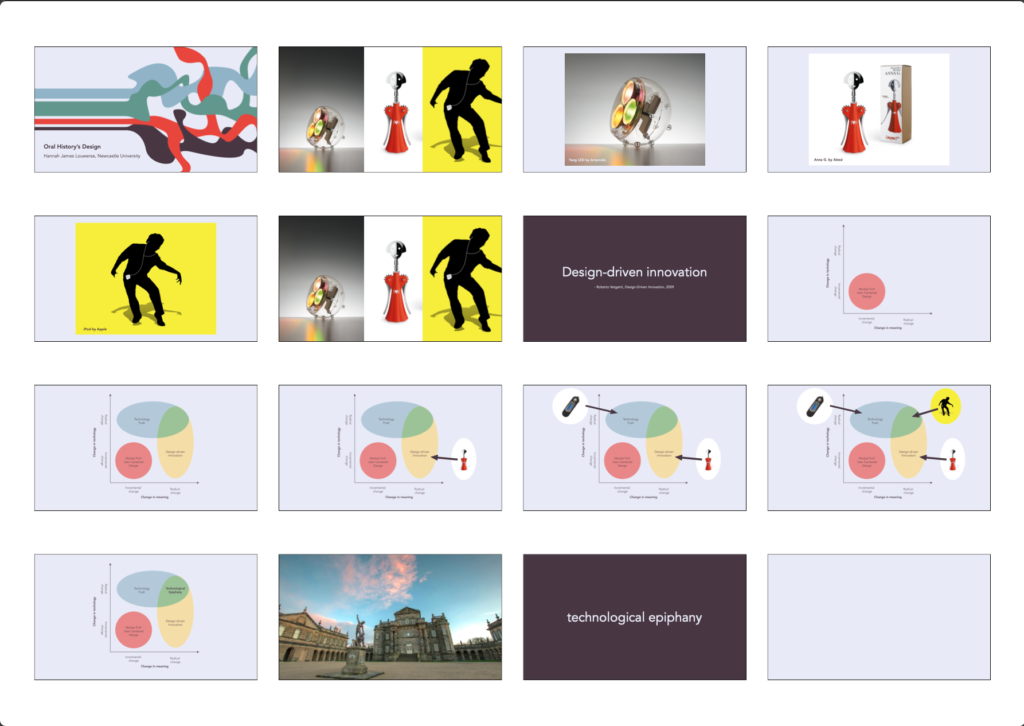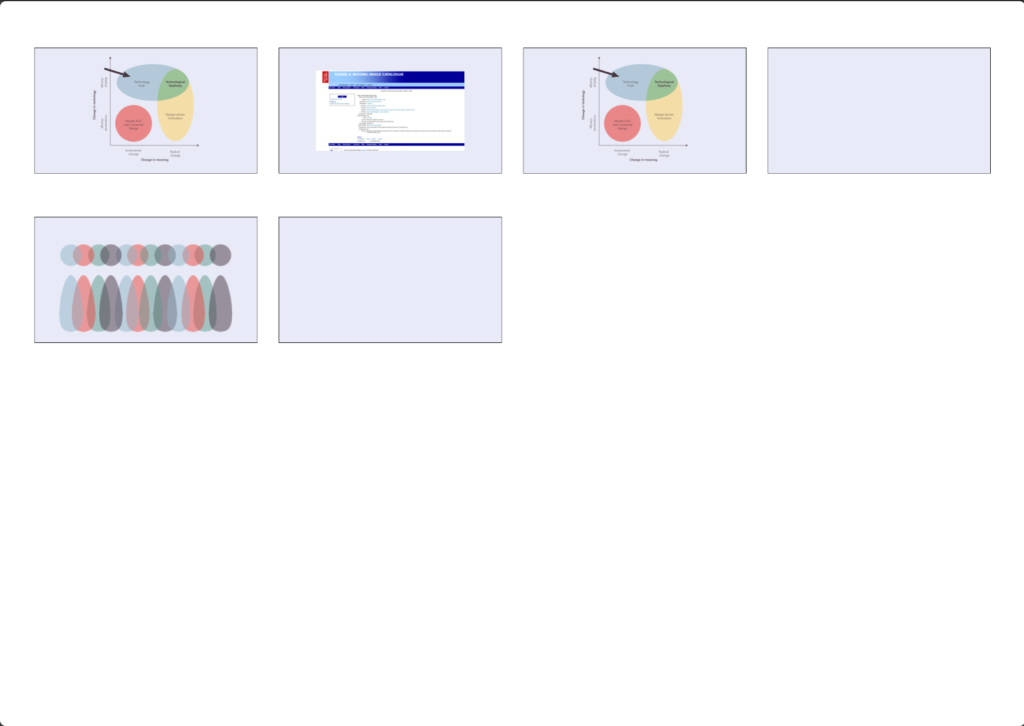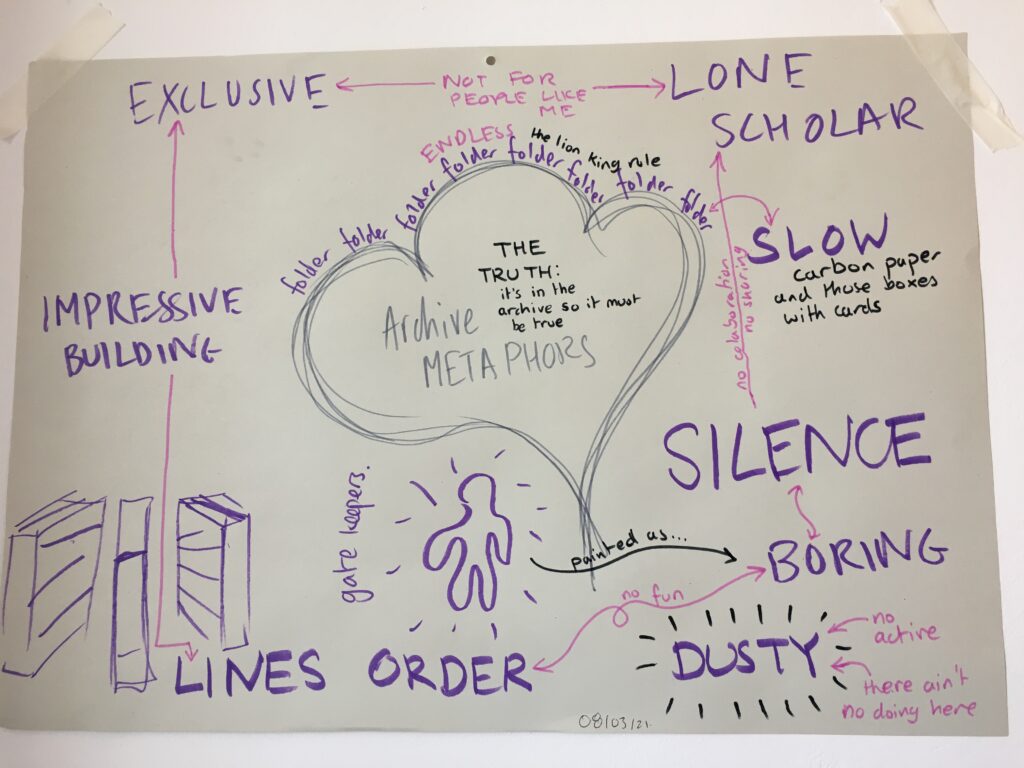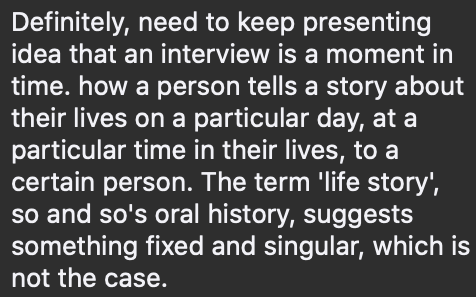Tag Archives: Language
OHD_GRP_0178 The maintenance infrastructure of oral history
OHD_PRS_0126 Oral History’s Design
This presentation was only 3 minutes. There were some lovely archive nerds in the audience.
Slides


Script
[slide one]
What do this lamp, this corkscrew and the iPod have in common?
Other than the fact that they are all very colourful, they also all radically changed the meaning of their use in comparison to their predecessors.
[slide two]
Lamps are there to illuminate a room and look pretty.
But Yang LED was made to adapt to the mood of resident and is not even meant to be seen.
[slide three]
Corkscrews are there to open my wine
But this corkscrew by Alessi “dances” for you.
[slide four]
Portable music players allowed you to listen to music on the move.
But the iPod allowed you to cheaply buy songs from iTunes and then curate them into your own personal soundtrack.
[slide five]
All three of these examples and their respective change in meanings are the result of design-driven innovation a term used by the design scholar Roberto Verganti in a book by the same name.
Design-driven innovation works like this…
[slide six]
Here on this graph we have two axis: change in technology and a change in meaning both have a scale from incremental to radical change. In the corner we have market pull/user-centered design.
[slide seven]
Here we have the bubble design-driven innovation, where see radical change in meaning and the bubble technological push where there is radical change in technology.
In this yellow part where there is a radical change in meaning but not in technology we find designs like alessi’s corkscrew.
In this blue section we find technologies like the first mp3 player, which was a significant technological upgrade from portable cassette and cd players.
Now in this green part we find the iPod.
[slide eight]
This is green part is what Verganti refers to as a technological epiphany.
[slide nine]
My PhD is in collaboration with the National Trust property Seaton Delaval Hall. This property wishes to create an oral history archive and the reason that I started this presentation by talking about the now obsolete iPod is because just like Apple did in 2001 I would also like to achieve a
[slide ten]
technological epiphany.
[slide eleven]
Presently archives are very busy digitising their collections which is great especially during the pandemic.
[slide twelve]
However this push to digitise fall very much in the blue technological push category. Everyone else is online so archives better move there too. The result of this however is websites that look like this.
[slide thirteen]
Not particularly sexy or even that helpful.
[slide fourteen]
What I want to do with my project is actually stop and think about how this technology could actually change the meaning of archiving.
[slide fifteen]
Venganti describes the many ways one can achieve this but it all boils down to doing a lot of talking across disciplines.
[slide sixteen]
How would a graphic designer redesign this page? How does the PhD student feel when they are in an archive? How would an environmentalist make a sustainable archive? How do game designers handle information? Many questions, a lot of information and hopefully a change in what it means to archive.
OHD_BLG_0065 New words among other things
Readings:
Community archives and the health of the internet by Andrew Prescott
Steering Clear of the Rocks: A Look at the Current State of Oral History Ethics in the Digital Age by Mary Larson
Sometimes I feel like we are in the trenches with our machine guns and old military tactics…
This ain’t for you
People live their lives in very specific ways. They have certain rituals and values that they hold very close to their hearts. However it is very unlikely that everyone else in the world has the same approach to life as you do. Some people do not use the right tea towel in my opinion, some people think it is perfectly fine to wear socks in sandals, and some people a zero problems with eating meat everyday. In the case of Prescott’s paper on community archives/Facebook groups we have an academic freaking out because a community is not archiving properly something which he considers to be a great sin, and yes, in a certain way it is a great shame that a community archive is not sustainable because of the platform used or the limited funding. This is especially the case when you come from an oral history angle where one really wants to preserve the voices of those who current fall outside of history. However, maybe we need to remove the academic lens in these situations, maybe these archives just aren’t for you. They have a different, more temporary, function to bring people together over a shared history. They are about sharing history not preserving history like archives do.
This is where I think I (as an academic 🤢) feel that my role is not to impose my beliefs onto these make-do archives but instead build better tools to support them. A community archive on Facebook is a different beast to the university backed oral history project. Truly it is a shame that this knowledge might go missing, but then I suggest that we get more minorities to work in academia rather than dictate what we think they should do.
It’s a power thing.
Anonymity is anti-oral history ?
…, anonymity is antithetical to the goals of oral history if there are no exacerbating risk factors.
Mary Larson
Anonymity, accountability, freedom of speech, privacy, welcome to the 21st century. There is the opinion within the field of oral history that anonymity is against the principles of oral history. This is mostly because oral history demands a high level of context in its reuse, which makes complete sense. However does that mean that all information should be available? Is it impossible to have different levels of anonymity?
It seems odd that currently when it comes to privacy we have to work in such absolutes. You can get a certain level of privacy on the internet but that often requires lots of digging around and downloading plugins that send out white noise. You basically have to spend time fending off those who run the platforms you use, which when put in a AFK context would be the equivalent of the shop keeper pickpocketing you while you were shopping. Currently privacy and anonymity equals not using either the internet or archives, which defeats the point.
Why is this our only option?
Well, in my opinion it is not. We just need to get a bit more creative for example:
- Use pseudonyms
- Use other identifiers e.g. White, young adult, middle class, female (that’s me)
- Use identifiers + 𝓲𝓶𝓪𝓰𝓲𝓷𝓪𝓽𝓲𝓸𝓷. There are loads of researchers who have to use their imagination because history has not been good at recording their subject
- Only allow access to certain information if you either visit the BAM archive or ask for permission
- Generally encourage more thorough and ethical reuse and research
New words
To elaborate on that last point we currently approach the ethics around archiving from the donating angle; if everything is correctly archived now there will definitely be no more problems in the future. This attitude I do not find very sustainable because attitudes towards ethics change all the time. So instead I purpose a different angle: ethical reuse of archival material lies predominantly with the reuser not the donator. This is where I would also like to insert the ‘new’ words. Instead of using the terms ethical and ethics we instead use responsibility and care, because the former is so slippery so ‘high-level’ thinking that it loses its meaning while the latter are more human words. Responsibility and care are concepts that you teach your children. They are more instinctive. So what I wish for is more care and responsibility from those who reuse oral histories. I want the reuser to remember the human-ness of the archive and the responsibility they have to care for their other humans.
NOTE: this is why I love the idea of archival ghosts so much because it gives the oral histories a face.
OHD_BLG_0068 it’s always language
A couple of weeks ago I learnt about structuralism and post-structuralism and post-modernism. All these concepts that I did not know about and now do know about and think they are fine but not as great as some people think they are. I am now going to talk about them in a very crude and simplified way by discussing the one thing that I really took from all of this and that is language.
It is the way we talk about things that sets up power. For example the word archive evokes ideas of dust and a general boring space. This is mostly because the symbols and cultural metaphors we use to communicate the archive beyond the word are generally boring dusty spaces.

This is also why there was confusing during MDI group because different people had assigned different symbols and metaphors to words e.g. concept.
It is very frustrating that our fundamental way of communicating with each other is not very clear at all. But maybe that is because we put too much value on verbal communication. Some philosophers considering it the purest form of expression but it is not. Firstly we have different languages, then we have different dialects and slang and all of this influenced by how the individual experiences the world. However the majority of people know what this is ☁️.
Visual and kinetic communication and aural communication that is not speaking but sounds or music are also fundamental ways to communicate. In some cases it might be more fitting to communicate in a visual way or kinetic way. So limiting ourselves to writing or speaking seems a miss opportunity.
An idea has to be communicated and humans need to communicate but maybe we need to tailor the communication more both to the speaker and the audience.

I realise now that I am doing exactly what these philosophers did complain about the limitation of language through the limiting language. How very frustrating. But that is what language very frustrating.














